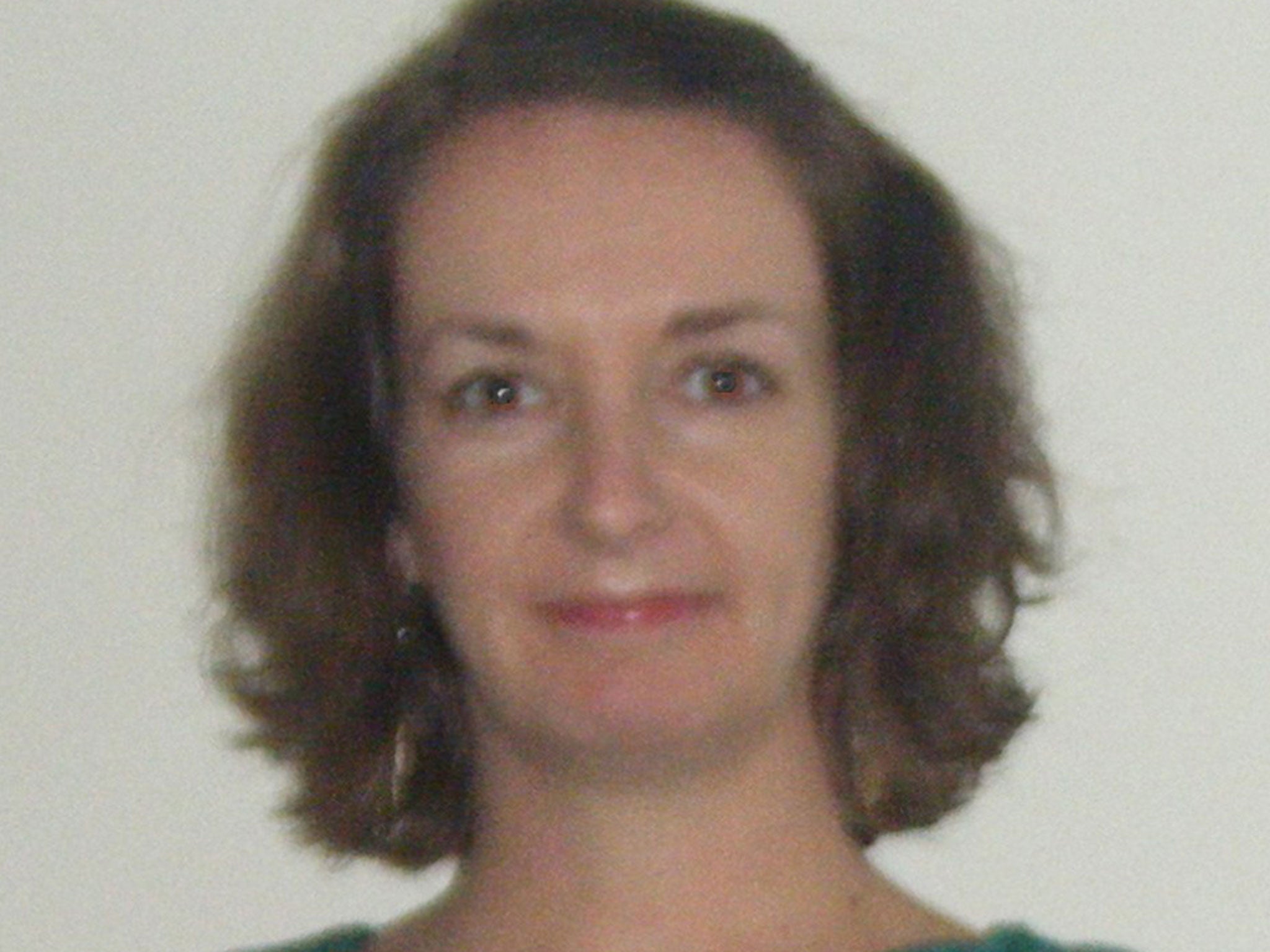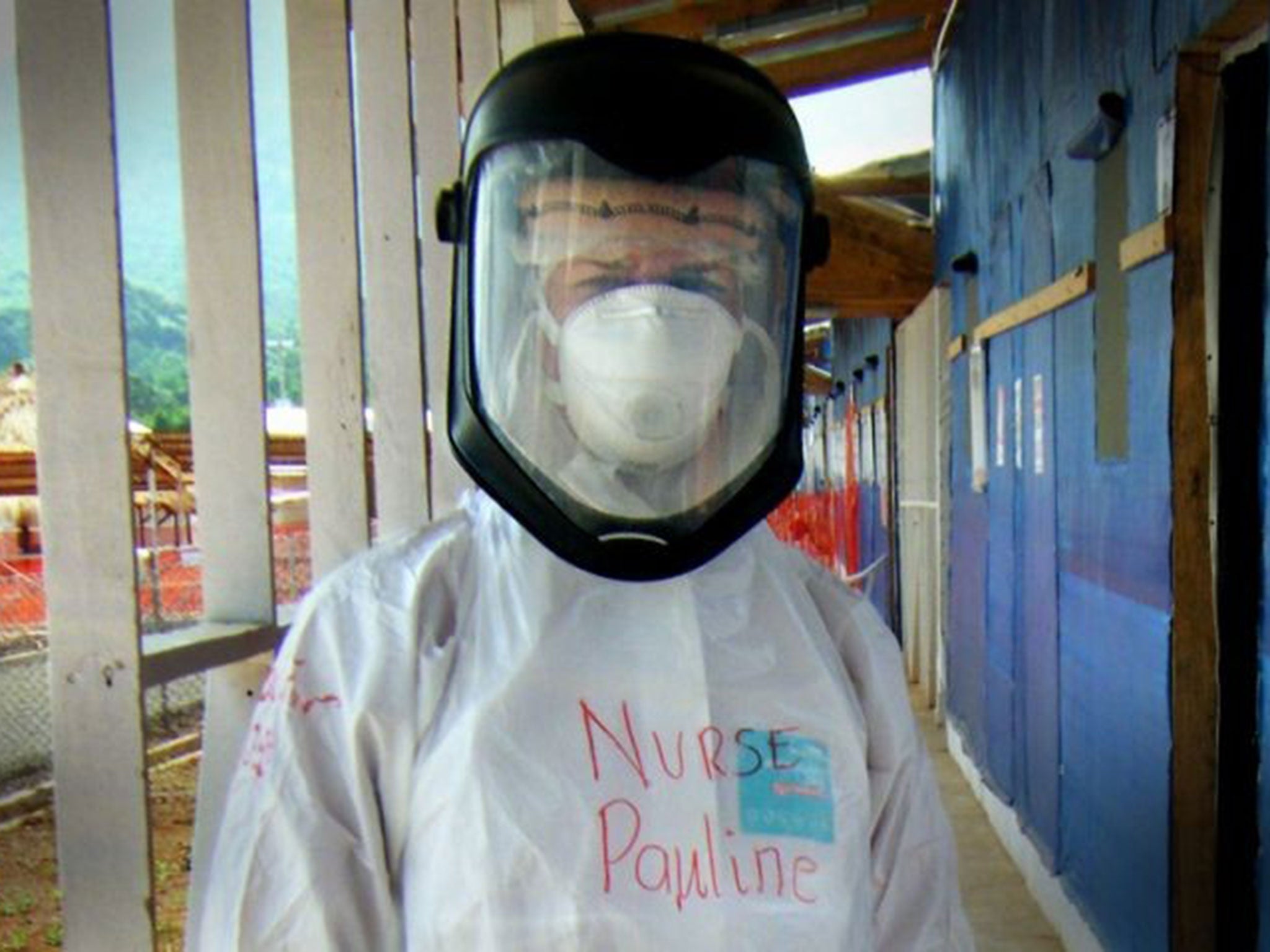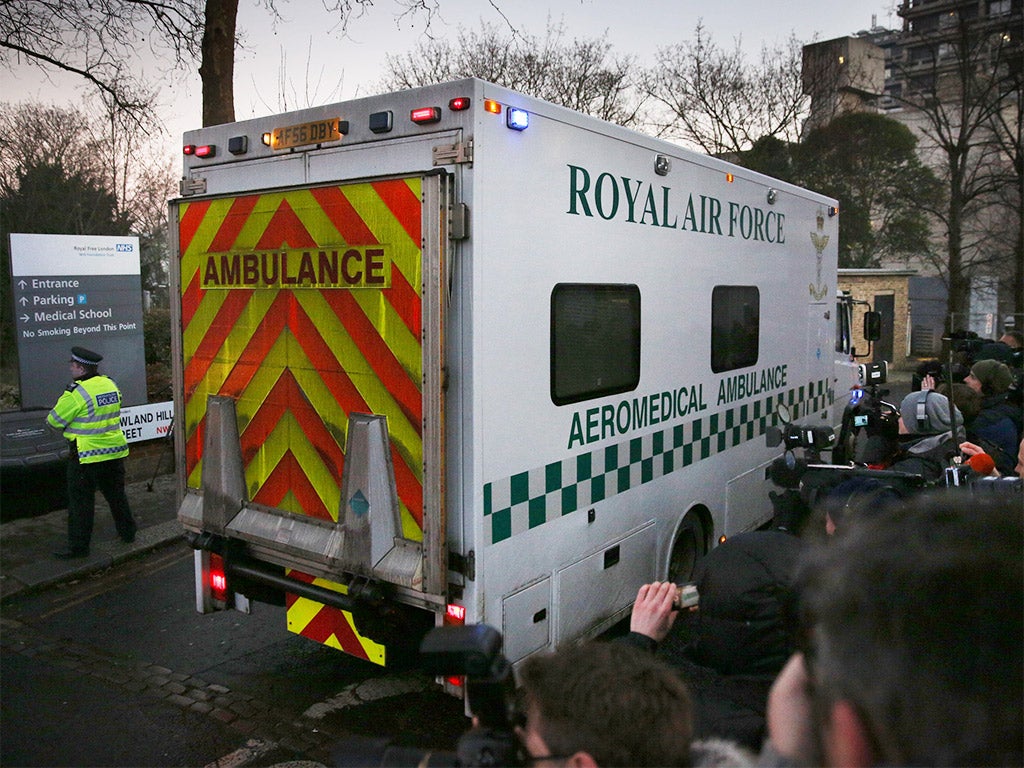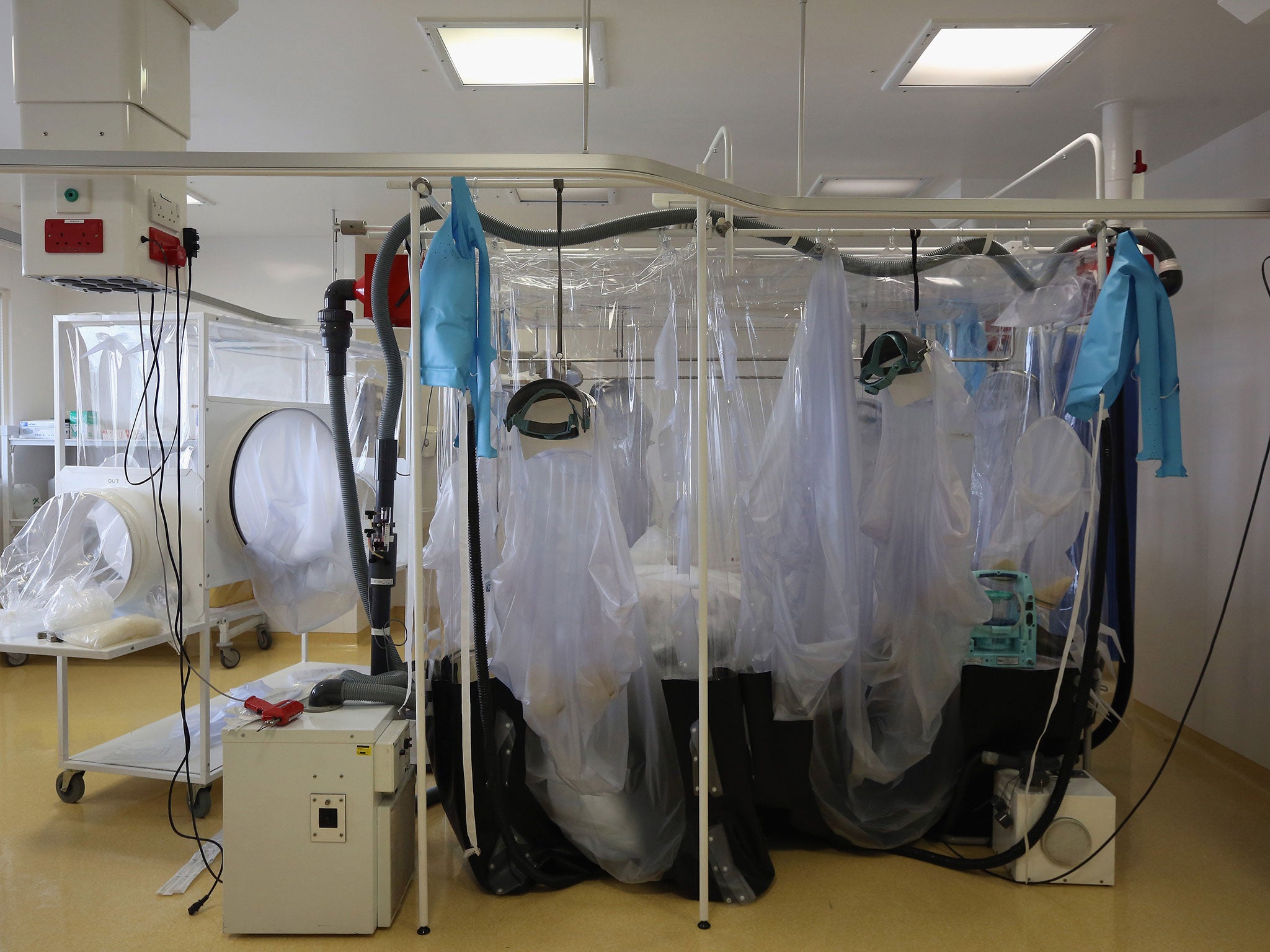Get the free Morning Headlines email for news from our reporters across the world Sign up to our free Morning Headlines email
The condition of the Scottish nurse being treated for Ebola has stabilised, according to the Health Secretary.
Jeremy Hunt said Pauline Cafferkey remains in a critical condition at London's Royal Free Hospital, where she receiving the "best possible care" in isolation.
“She said in Sierra Leone that she hoped her loved ones would be proud of her," he told MPs in the House of Commons.
"Well, she should know today the whole country is proud of her for her bravery and dedication to the service of others.
“She stands, quite simply, for the very best of NHS values."
His statement this afternoon came as Save the Children, which ran the treatment centre where she worked in Sierra Leone, promised that a review into how she contracted the disease will leave "no stone unturned".
Pauline Cafferkey worked with Ebola patients in Sierra Leone (EPA) Mrs Cafferkey, a NHS nurse, caught the deadly virus despite the use of protective equipment and strict infection controls.
She became the first person to be diagnosed with Ebola in the UK last week, after she returned to Glasgow, sparking an operation to trace other passengers on her flights.
The 39-year-old is being treated at the Royal Free Hospital in London. It houses the UK's specialist treatment centre for the disease, which has killed almost 8,000 people worldwide.
A spokesperson for the hospital said on Saturday that her condition had "gradually deteriorated over the past two days" to become critical.
The convoy carrying Pauline Cafferkey arrives at The Royal Free hospital in London (Getty Images) Just three days before, doctors had issued happier news that Mrs Cafferkey was “sitting up in bed, talking and reading”.
She chose to receive plasma treatment, which uses the blood of Ebola survivors, as well as an experimental anti-viral drug that was not officially named.
Ms Cafferkey was admitted to the Royal Free last Tuesday after being diagnosed the previous day by doctors in Glasgow, where she had arrived from Heathrow after flying from Sierra Leone via Casablanca in Morocco.
She had undergone several health checks during her journey and despite complaining of feeling feverish she was allowed to continue to her home in South Lanarkshire.
Mrs Cafferkey had worked as a nurse for 16 years before starting volunteering with Save the Children to help with the Ebola crisis.
A general view of a High Level Isolation Unit at the Royal Free hospital (GETTY IMAGES) She flew out to Freetown in November with four other Scottish volunteers and a contingent of 30 NHS staff from around the UK as part of a government-funded project.
During her time in Sierra Leone's “red zone”, she wrote a diary about her experiences for the Scotsman newspaper, chronicling her journey from the Blantyre Health Centre in South Lanarkshire to Ebola's front line.
She said she felt well-protected in the “alien-type suit” of protective clothing health workers wear in 30C heat, joking that they would “certainly be beneficial on a cold winter's night in Scotland”.
In her third week, Mrs Cafferkey described the harrowing experience of watching a woman die from Ebola as her young son watched through the window, made an orphan by the virus that claimed both parents and his sister.
“The sad thing is that this is a regular occurrence and we see and hear of whole families being wiped out by this awful disease,” she wrote.
Show all 62 1 /62In pictures: Ebola virus In pictures: Ebola virus Ebola virus A health worker from Sierra Leone's Red Cross Society Burial Team 7 carries the corpse of a child in Freetown
In pictures: Ebola virus Ebola virus A health workers from the Sierra Leone's Red Cross Society Burial Team 7 is sprayed with desinfectant after removing a corpse from a house in Freetown
In pictures: Ebola virus Ebola virus Health workers from Sierra Leone's Red Cross Society Burial Team 7 prepare to remove a body from a house in Freetown
AFP
In pictures: Ebola virus Ebola virus Health workers from the Sierra Leone's Red Cross Society Burial Team 7 place a body in a grave at King Tom cemetary in Freetown
In pictures: Ebola virus Ebola virus Mustapha Rogers of the Red Cross talks as health workers from the Sierra Leone's Red Cross Society Burial Team 7 remove a corpse from a house in Freetown
In pictures: Ebola virus Ebola virus A citizen from Mali arrives at a hospital in Murcia city, south-eastern Spain. The protocol for a possible case of Ebola has been activated as the man, who arrived from Mali to Jumilla town in Murcia province five days ago, presents clinical symptoms of high fever and vomiting
EPA
In pictures: Ebola virus Ebola virus Kenyan medical workers show how to handle an infected Ebola patient on a portable negative pressure bed at the Kenyatta national hospital in Nairobi
Getty Images
In pictures: Ebola virus Ebola virus A health worker sprays disinfectant onto a college in Monrovia, Liberia
AP
In pictures: Ebola virus Ebola virus A burial team in protective gear bury the body of a woman suspected to have died from Ebola virus in Monrovia, Liberia
In pictures: Ebola virus Ebola virus Healthcare workers in protective gear work at an Ebola treatment center in the west of Freetown, Sierra Leone
AP Photo/Michael Duff
In pictures: Ebola virus Ebola virus A healthcare worker in protective gear is sprayed with disinfectant after working in an Ebola treatment center in the west of Freetown, Sierra Leone
In pictures: Ebola virus Ebola virus A member of the NGO U Fondation leaves a house after visiting quarantined family members suffering from the Ebola virus in Monrovia
In pictures: Ebola virus Ebola virus An Ebola sign placed infront of a home in West Point slum area of Monrovia, Liberia
In pictures: Ebola virus Ebola virus A Liberian man carries his sick brother suspected of having Ebola after being delayed admission to the Island Clinic Ebola Treatment Unit due to a lack of beds at the clinic on the outskirts of Monrovia, Liberia
In pictures: Ebola virus Ebola virus Health workers remove the body a woman who died from the Ebola virus in the Aberdeen district of Freetown, Sierra Leone
In pictures: Ebola virus Ebola virus A health worker fixes another health worker's protective suit in the Aberdeen district of Freetown, Sierra Leone
In pictures: Ebola virus Ebola virus Health workers spray themselves with chlorine disinfectants after removing the body a woman who died of Ebola virus in the Aberdeen district of Freetown, Sierra Leone
In pictures: Ebola virus Ebola virus A woman crawls towards the body of her sister as Ebola burial team members take her sister Mekie Nagbe (28) for cremation in Monrovia, Liberia
In pictures: Ebola virus Ebola virus Sophia Doe sits with her grandchildren Beauty Mandi, 9 months (L) and Arthuneh Qunoh, 9, (R), while watching the arrival an Ebola burial team to take away the body of her daughter Mekie Nagbe, 28, for cremation in Monrovia, Liberia
In pictures: Ebola virus Ebola virus Varney Jonson (46) grieves as an Ebola burial team takes away the body of his wife Nama Fambule for cremation in Monrovia, Liberia
In pictures: Ebola virus Ebola virus Family members grieve as Ebola burial team members prepare to remove the body of Nama Fambule for cremation in Monrovia, Liberia
In pictures: Ebola virus Ebola virus A Liberian burial squad carry the body of an Ebola victim in Marshall, Margini county, Liberia
In pictures: Ebola virus Ebola virus An Ebola burial team dresses in protective clothing before collecting the body of a woman (54) from her home in the New Kru Town suburb of Monrovia, Liberia
In pictures: Ebola virus Ebola virus An Ebola burial team carries the body of a woman (54) through the New Kru Town suburb of Monrovia, Liberia
In pictures: Ebola virus Ebola virus An Ebola burial team dresses in protective clothing before collecting the body of a woman (54) from her home in the New Kru Town suburb of Monrovia, Liberia
In pictures: Ebola virus Ebola virus Health workers in protective gear carry the body of a woman suspected to have died from Ebola virus, from a house in New Kru Town at the outskirt of Monrovia, Liberia
In pictures: Ebola virus Ebola virus Volunteers in protective suit bury the body of a person who died from Ebola in Waterloo, some 30 kilometers southeast of Freetown
FLORIAN PLAUCHEUR/AFP/Getty Images
In pictures: Ebola virus Ebola virus Nowa Paye (9) is taken to an ambulance after showing signs of the Ebola infection in the village of Freeman Reserve, about 30 miles north of Monrovia, Liberia
In pictures: Ebola virus Ebola virus Medical staff members burn clothes belonging to patients suffering from Ebola, at the French medical NGO Medecins Sans Frontieres (MSF) in Monrovia
PASCAL GUYOT/AFP/Getty Images
In pictures: Ebola virus Ebola virus A medical staff member wearing a protective suit walks past the crematorium where victims of Ebola are burned in Monrovia
In pictures: Ebola virus Ebola virus A Liberian burial team wearing protective clothing loads the body of a 60-year-old Ebola victim after retrieving him from his home
Getty Images
In pictures: Ebola virus Ebola virus Sick women rest while hoping to enter the new Doctors Without Borders (MSF), Ebola treatment center near Monrovia, Liberia
Getty Images
In pictures: Ebola virus Ebola virus Hanah Siafa walks in the rain with her children Josephine, 10, and Elija, six, while waiting to enter the new Doctors Without Borders (MSF), Ebola treatment center in Monrovia, Liberia
Getty Images
In pictures: Ebola virus Ebola virus UNICEF health workers walk through the streets, going house to house to speak about Ebola prevention in New Kru Town, Liberia. The virus has killed more than 1,000 people in four African countries
Getty Images
In pictures: Ebola virus Ebola virus Local residents watch as public health advocates stage an Ebola awareness and prevention event in Monrovia, Liberia
Getty Images
In pictures: Ebola virus Ebola virus Public health advocates stage an Ebola awareness and prevention event in Monrovia, Liberia. The Liberian government and international groups are trying to convince residents of the danger and are urging people to wash their hands to help prevent the spread of the epidemic
Getty Images
In pictures: Ebola virus Ebola virus Hanah Siafa lies with her children Josephine, 10, and Elija, six, while hoping to enter the new Doctors Without Borders (MSF), Ebola treatment center
Getty Images
In pictures: Ebola virus Ebola virus A health worker examines patients for Ebola inside a screening tent, at the Kenema Government Hospital
AP
In pictures: Ebola virus Ebola virus A health worker cleans his hands with chlorinated water before entering an Ebola screening tent at the Kenema Government Hospital, about 86 miles from Sierra Leone’s capital Freetown
AP
In pictures: Ebola virus Ebola virus Aid workers and doctors transfer Miguel Pajares, a Spanish priest who was infected with the Ebola virus while working in Liberia, from a plane to an ambulance as he leaves the Torrejon de Ardoz military airbase, near Madrid, Spain
AP Photo/Spanish Defense Ministry
In pictures: Ebola virus Ebola virus A Liberian money exchanger washes hands between customers as a precaution to prevent infection with the deadly Ebola virus while conducting business in downtown Monrovia, Liberia
EPA
In pictures: Ebola virus Ebola virus A Liberian health worker sprays disinfectant on a drivers boots to stop the spread of the deadly Ebola virus at the Christian charity Samaritan Purse head offices in Monrovia, Liberia. Over 660 people have died of Ebola in West Africa in 2014 making it the world's deadliest outbreak to date according to statistics from the World Health Organisation
EPA
In pictures: Ebola virus Ebola virus A Liberian taxi driver wears protective gloves as a precaution to prevent infection with the deadly Ebola virus whilst driving in downtown Monrovia, Liberia. Many Liberians have taken to wearing gloves and washing hands after every interaction in an attempt to curb the spread of the deadly virus
EPA
In pictures: Ebola virus Ebola virus A Liberian money exchanger wears protective gloves as a precaution to prevent infection with the deadly Ebola virus while transacting business with customers in downtown Monrovia, Liberia
EPA
In pictures: Ebola virus Ebola virus A woman from Liberia takes food to a sick relative in the Ebola isolation unit at the ELWA Hospital where US doctor Kent Bradley is being quarantined having contracted the Ebola virus. Over 660 people have died of Ebola in West Africa in 2014 making it the world's deadliest outbreak to date according to statistics from the World Health Organisation
EPA
In pictures: Ebola virus Ebola virus The disease has now spread to Liberia and, for the first time, Sierra Leone and Nigeria, killing at least 672 people in 1,201 cases, according to the World Health Organisation’s latest figures
AP
In pictures: Ebola virus Ebola virus Health specialists prepare for work in an isolation ward for patients at the Medecins Sans Frontieres facility in southern Guinea
AFP/Getty Images
In pictures: Ebola virus Ebola virus A Liberian street vendor wears protective gloves as a precaution to prevent infection with the deadly Ebola virus while transacting business with customers in downtown Monrovia, Liberia
EPA
In pictures: Ebola virus Ebola virus A nurse from Liberia sprays preventives to disinfect the waiting area for visitors at the ELWA Hospital where a US doctor Kent Bradley is being quarantined in the hospitals isolation unit having contracted the Ebola virus, Monrovia, Liberia
EPA
In pictures: Ebola virus Ebola virus Staff of the 'Doctors without Borders' ('Medecin sans frontieres') medical aid organisation carry the body of a person killed by the virus
In pictures: Ebola virus Ebola virus A Liberia man (right) talks to a nurse (left) about the health of his relative who is in the isolation unit of the ELWA Hospital where a US doctor Kent Bradley is being quarantined having contracted the Ebola virus, Monrovia, Liberia
EPA
In pictures: Ebola virus Ebola virus A nurse from Liberia walks to spray preventives to disinfect the waiting area for visitors at the ELWA Hospital where a US doctor Kent Bradley is being quarantined in the hospitals isolation unit having contracted the Ebola virus
EPA
In pictures: Ebola virus Ebola virus Staff of the Christian charity Samaritan's Purse put on protective gear in the ELWA hospital in the Liberian capital Monrovia
AFP
In pictures: Ebola virus Ebola virus Lagos State Health Commissioner Jide Idris, speaks, during a news conference in Lagos, Nigeria. No one knows for sure just how many people Patrick Sawyer came into contact with the day he boarded a flight in Liberia, had a stopover in Ghana, changed planes in Togo, and then arrived in Nigeria, where authorities say he died days later from Ebola
AP Photo/Sunday Alamba
In pictures: Ebola virus Ebola virus Staff of the Christian charity Samaritan's Purse put on protective gear in the ELWA hospital in the Liberian capital Monrovia. An American doctor battling West Africa's Ebola epidemic has himself fallen sick with the disease in Liberia, Samaritan's Purse said
AP
In pictures: Ebola virus Ebola virus Protective gear including boots, gloves, masks and suits, drying after being used in a treatment room in the ELWA hospital in the Liberian capital Monrovia
AFP
In pictures: Ebola virus Ebola virus A Liberian man holding a Civet being sold on a roadside as bush meat in Lofa County. Bush meat is one of the major carriers of the Ebola virus. The Liberian government and International partners have warned people to not eat it. The World Health Organisation (WHO) reported that a total of 888 Ebola cases including 539 deaths have been recorded in West Africa since February
AFP
In pictures: Ebola virus Ebola virus People unload protection and healthcare material at Conakry's airport, to help fight the spread of the Ebola virus and treat people who have been already infected
AFP/Getty Images
In pictures: Ebola virus Ebola virus Body of evidence: health workers transport a casket of a nun whose death resulted from an Ebola infection in Zaire in 1995
Getty
In pictures: Ebola virus Ebola virus Peter Piot in Yambuku, northern Congo (then Zaire), in 1976, where he was part of the original team to discover the Ebola virus
J Breman
In pictures: Ebola virus Ebola virus A member of Doctors Without Borders helps to unload protection and healthcare materials in Guinea
Getty
In pictures: Ebola virus Ebola virus Doctors in protective gear work inside the Medecins Sans Frontieres isolation ward as Guinea faced the worst ever outbreak of the Ebola virus
Getty Images
“It helps us remember the good work we are doing and the reason we are all here,” she wrote.
Save the Children said it may never be possible to be completely sure how Mrs Cafferkey was infected.
The statement from the charity said: “The work of these brave health workers is never risk-free, but we are committed to doing everything possible to learn what happened and, if necessary, to make changes to our protocols and practice.
"Staff safety is our number one priority and our thoughts are with Pauline and her family at this very difficult time.”
Additional reporting by PA






Join our commenting forum
Join thought-provoking conversations, follow other Independent readers and see their replies
Comments